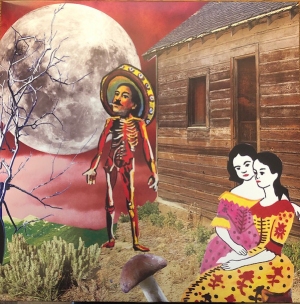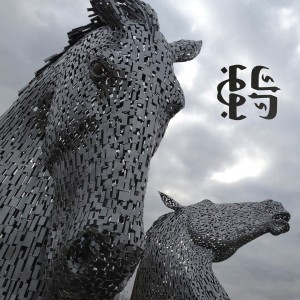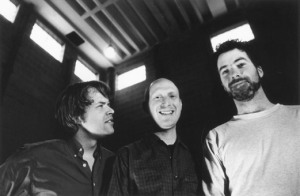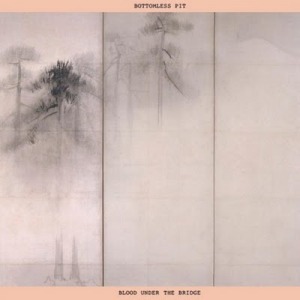
Silkworm’s In the West originally came out on CD and cassette on Seattle’s C/Z Records in 1994. I don’t recall specifically when or where I picked up a copy, but I can feel the accumulated grime on my fingertips from flipping through CD bins searching for it, triggering a Pavlovian response to go wash my hands. In the West lingers in that context, the feverish nightmare of its cut-and-paste cover art sharing an early-’90s aesthetic with countless other denizens of those bins, even as its contents far surpassed its now-forgotten neighbors. A quarter century after its initial release, Comedy Minus One honors In the West with its first-ever vinyl pressing, updating elements of its cover art but retaining the unsettling spirit of the original, blackened layer of dust not included.
This half-measure feels appropriate, as In the West deserves to be brought into 2019 but cannot be fully extracted from 1994. “Dated” is typically derogatory, but context is not, and In the West benefits from understanding its place within Silkworm’s development. After working through a series of demo cassettes during their infancy in Missoula, Montana and move to Seattle, Silkworm released their debut album L’ajre in 1992, followed by a string of seven-inch singles and the …His Absence Is a Blessing EP. There are flashes of excellence during those early years, later collected by Matador in the 2CD Even a Blind Chicken Finds a Kernel of Corn Now and Then: ’90–’94, particularly Tim Midyett’s affable “Slipstream,” Andy Cohen’s defiant “Scruffy Tumor,” and Joel R. L. Phelps’s reference-setting cover of The Comsat Angels’ post-punk classic “Our Secret,” but as the compilation’s self-effacing title acknowledges, they hadn’t figured it all out yet. In the West is the first point when their various influences and individual songwriting voices congealed into a whole, a process that would be furthered just eight months later with the release of its follow-up, Libertine (which is also once again on vinyl via CMO) then blown up by Phelps’s departure.
A congested timeline to be sure, but In the West was a significant milestone. Recorded by fellow Missoula native Steve Albini (dutifully uncredited), stylistically it bears far closer resemblance to early ’80s post-punk, like Mission of Burma or the aforementioned Comsat Angels (Waiting for a Miracle, Sleep No More, and accompanying singles only), than most of their contemporaries. I doubt their adopted homebase of Seattle did them any critical favors; In the West had just enough early-’90s scuzz in its guitar tones for unfocused scribes to absentmindedly sort them into the grunge pile, where their songwriting approaches would be decidedly out of place. (Not that critics, then or now, always bother to differentiate who’s singing which songs.)
The most nagging detriment of In the West’s 1994 date stamp has thankfully been corrected: the remix/remaster job for this reissue is a night-and-day difference from its original release, which suffered from era-typical muddiness and a thin mix that shackled drummer Michael Dahlquist’s considerable power. Starting with 1996’s Firewater, Silkworm’s albums carried a reference-quality combination of space, punch, and clarity—exemplars of Albini’s “the sound of a band in a room” engineering ethos—and this update brings In the West in line with those later recordings, which is no minor achievement. In the West is a dramatically different experience with a palpable rhythm section. It officially sounds like a Silkworm album, not a dry run at one.
In the West, then and now, is a uniquely dark album in Silkworm’s catalog, equally explosive and implosive. With the possible exception of its predecessor L’ajre (I’ll take the zero on the homework of revisiting that album), In the West is Silkworm’s heaviest guitar rock record, with Andy Cohen and Joel R. L. Phelps frequently churning thick chord progressions into clouds of noise, a practice that Libertine largely abandons. These storms are dynamically balanced with unsettling lulls, passages where the guitars vanish and minimalism takes over. There are deep-rooted melodies on most songs, but the up-tempo tracks skew more rocking than overtly catchy, with no earworms like Libertine’s “Couldn’t You Wait” or Lifestyle’s “Treat the New Guy Right.”
Typical to Silkworm’s democratic principles, In the West features a nearly even split between the three songwriters, but my reductive take on their respective approaches—Tim Midyett as the introspective, casually funny romantic, Cohen as the black-humored, semi-historical storyteller, Phelps as the nervy font of psychodrama—hasn’t quite settled yet. Midyett’s four songs are caught between Missoula and Seattle, youth and adulthood, with “Garden City Blues” ruminating on the mixed feelings of a return home, rousing from quiet reservations to unencumbered emotions. “Punch Drunk Five” evokes Montana in the final few lines of its hormonal rave-up, while the rocking “Incanduce” flits between staying, going, returning, and running away before being overcome a monstrous, low-slung riff. The most atypical Midyett contribution is the eight-minute “Enough Is Enough,” which gradually arcs from whisper to roar along with its uncomfortable lyrics about a pushy date. There are moments of humor in these songs, most notably the exasperated “Aw Jesus Christ!” in “Punch Drunk Five,” but Midyett’s search for himself and/or someone else tends to be lonely, over-excited, or frustrated, not poised. The stellar “Garden City Blues” is his best song on In the West, in possession of perspective rather than in pursuit of it.
In one sense, the quick synopsis of Andy Cohen’s songwriting applies to his trio of songs here: pitch-black humor coats almost every line (“Go into the woods and live with the bears / That way you can kill someone and nobody cares,” “Then I grabbed a drowning man / I used him for a raft”), loose narratives put Cohen’s voice in violent, unsavory characters, and why yes, that is a reference to General Pershing in “Dust My Broom.” In another sense, they leave you wanting more than the synopsis: Cohen improved dramatically over the next few albums in his ability to imbue potentially unlikeable characters with affecting depth (see Firewater’s trio of “Slow Hands,” “Tarnished Angel,” and “Don’t Make Plans This Friday”). This concern doesn’t matter much for “Dust My Broom” and “Into the Woods,” whose riffs scorch the earth like Sherman’s March to the Sea, but the slow-boiling “Parsons” never leans out of the lyrical darkness and is most compelling during its instrumental bridge.
It’s impossible to overstate the degree to which Joel R. L. Phelps ratchets up the intensity level on In the West; whether quietly repeating a line in a shell-shocked trance or howling loud enough to wake the neighborhood, Phelps commands dramatic tension like few other songwriters. “Raised by Tigers” (which I wrote about more extensively at One Week // One Band) condenses a wartime novella about the younger brother left at home into five masterful minutes. The initially sparse “Dremate” takes heart-on-sleeve to the utmost extreme, turning over the promise “Bare to you my heart” and its myriad ramifications before bursting into flames with the screamed refrain “Say that you will.” The bass-driven post-punk of “Pilot” closes In the West in an intriguing way, given the hair-raising climaxes of Phelps’s other two songs. The lyrics give full warning of what might come—“When I collide it will be something to remember / When I fall from the light it will be something to remember”—but even as Phelps teases a full-out yelp in the final minute, he pulls back, teetering on the precipice of that fall. Instead of the mammoth chords that shook many of the preceding songs, dual leads snake over the bridge, with Phelps’s wordless vocal accompaniment a welcome touch. Phelps excels on In the West at establishing and maintaining this unblinking level of intensity, but an entire album in this headspace would be draining. Phelps’s songs benefit from the shorter, punchier tracks like “Into the West” and “Incanduce” elsewhere on In the West; on Libertine and his solo / Downer Trio records, his wider range of approaches heightens the truly bristling moments.
To my knowledge, there’s no established hierarchy for Silkworm albums, no consensus ranking. You get to Silkworm albums when you get to them, and getting them doesn’t necessarily mean getting them. It took years (and the life experience acquired during those years) for me to fully appreciate Firewater, which finally clicked and became one of my favorite Silkworm records. Ranking them according to a perceived objective sense of quality misses the point: Libertine is a different experience than Firewater, which is a different experience from Developer, and so on, and the greatness of Silkworm comes from the range of those experiences. There are days when Lifestyle is my favorite Silkworm album and days when It’ll Be Cool is my favorite Silkworm album. This reissue puts In the West fully in the conversation. The songs were always there, but that old mix? It was work, a smudged lens distorting artistic intent. Now In the West is on a level playing field, and I understand its experience in a way that I hadn’t previously. It’s a darker, heavier experience than its brethren, and there will be days when that experience fits and days when it doesn’t. But 25 years after its release, and probably 20 after I first heard it, I get In the West. Maybe there’s still hope for L’ajre.
A valuable postscript: Almost two hours of bonus material is included in the digital download for In the West, and while little of it qualifies as essential listening for people who don’t self-identify as Silkworm devotees, that tag absolutely fits me and my appetite for ephemera, demos, and live recordings. Phelps’ rendition of the Christina Rossetti-penned Christmas carol “In the Bleak Midwinter” and Midyett’s yearning, “UK Surf”-esque alternate take on “Incanduce” (Dahlquist wrote on Silkworm’s web site “I think we tried to play quiet to mock some asswipe club owner, played ‘Incanduce’ in this sort of American Music Club way, and liked it enough to record it”) originally appeared on seven-inches and then Even a Blind Chicken, so they are both the best and most familiar tracks included here. (“Midwinter” is a precursor to Phelps’ more recent contributions to Comedy Minus One head Jon Solomon’s WPRB Xmas marathons, a few of which are available here.) There’s a raucous live rendition of The Dream Syndicate’s “Halloween.” Five songs are represented via seven direct-to-DAT demo recordings from 1991, including a pair of hyperspeed run-throughs of “Dust My Broom.” There are six individual live songs and a full 1993 set from Chicago’s venerable Lounge Ax, and the performances resonate through the mixed recording quality.
|

The only problem—if it qualifies as such—to Bottomless Pit’s otherwise flawless discography to date is insularity. Familiarity with Tim Midyett and Andy Cohen’s previous band Silkworm has been a borderline prerequisite. There are rewards to this condition: comparing and contrasting Hammer of the Gods (2007), the Congress EP (2008), and Blood Under the Bridge (2010) with Silkworm’s extensive catalog enlightens both sides of the equation, since every aesthetic shift is deliberate and carefully chosen, like Bottomless Pit’s signals to the melodic post-punk of early New Order. The lyrical connection is even more significant. Midyett and (to a lesser extent) Cohen have used Bottomless Pit’s music to reconcile their grief over the tragic passing of Silkworm drummer Michael Dahlquist. Bottomless Pit would not exist without Dahlquist’s passing, a truth those records cannot forget. For card-carrying members of Silkworm’s slowly expanding cult following, Bottomless Pit’s songs are immediately devastating, but my concern is whether this insider-oriented dialogue, coupled with the group’s downright inscrutable branding, has turned three of the finest rock records of the last decade into invite-only affairs.
Shade Perennial addresses that concern with a deft achievement: it opens the door, musically, lyrically, and even logistically to newcomers without compromising what made Bottomless Pit such a valuable proposition. Collecting their previous recordings (along with three unreleased tracks) in the Japanese import Lottery 2005–2012 offered Bottomless Pit a clean break in their discography, less a new chapter and more of the next book in the series, and they took full advantage of it. You can pick up Shade Perennial (issued via Comedy Minus One, marking the first time the group hasn’t self-released reference-quality 45 RPM vinyl) and not feel like you’re entering the middle of a conversation, or at least the seemingly private one I described earlier.
The conversation dominating Shade Perennial does not require an invitation. Tim Midyett, Andy Cohen, bassist Brian Orchard, and drummer Chris Manfrin have a chemistry that’s beyond second-nature. There are no clashes over territory: a rare democracy balances Midyett’s baritone guitar surges with Cohen’s chord slashes and strafing leads, and they’ll open up space for Orchard and Manfrin on quieter moments like “Full of Life.” Don’t mistake this observation for minor praise: you don’t get the subtle emotional shading and dynamic arcs of “Fleece,” the swaggering melodic exchange of “Incurable Feeling,” or the sun-peeking-through-the-clouds illumination of “Horse Trading” without completely dismissing egos. And yet for all of this emphasis on shading and detail, Shade Perennial offers some of Bottomless Pit’s most immediate songs to date, especially Andy Cohen’s trio of up-tempo rockers.
The biggest shift on Shade Perennial is in the songwriting department. You still get two distinct, equally compelling lyricists, but Midyett and Cohen’s respective approaches have evolved since Blood Under the Bridge. Most strikingly, no song on Shade Perennial reads as a rumination on the aftermath of Michael Dahlquist’s passing, whereas that topic hung over their first three records. When Midyett invokes King Poseidon in the opening "Fleece," the shift in perspective is jarring. It’s still a personal song, but there’s a creeping darkness (“You can hurt me but you don’t”) that was previously absent from his generally optimistic humanism. It isn’t until the rolling, six-minute closer “Felt a Little Left” that Midyett sounds embodies the eminently likeable Midyett of old, and the repetition of “I know I know I know” practically recognizes it. Cohen takes the opposite tact, further softening his once-contentious approach with an affecting delivery on “Null Set” (“Forgot about you / Myself too”) and poetic imagery in “Sacred Trench” (“They were just shadows”). He still explores atypical relations with humorous barbs (“Shoot the duck and you will win / What we do is like that stupid game / I honestly think I’m too straight to follow”), but at long last, it’s plausible that Cohen himself is the character being studied.
I recognize the apparent irony: even as I argue that Shade Perennial is less insular, less dependent upon Bottomless Pit’s history than its predecessors, I can’t avoid bringing up that history. View this impulse not as an invalidation of my thesis, but as another reward to any new listeners the album invites to the Silkworm/Bottomless Pit narrative. There is a rich history here—a towering stack of records you’ll have to pry from my cold, dead hands; an innate musical discourse within the group that can only come from Midyett and Cohen's 25 years of collaboration; two songwriters with distinct, constantly evolving voices—and Shade Perennial succeeds as both a standalone document and a gateway to what precedes it. Just remember, you don't need to hear all of the records at once.
|

I’m excited to report that I’ll be over at One Week // One Band until Friday writing about the songs of Silkworm. By all means head over there! In between my posts, check out their archives, to which many writers I respect and enjoy have contributed. Many thanks to Hendrik for this opportunity.
If you’re coming from One Band // One Week and wondering “Who’s this guy writing about Silkworm? Is he ever going to stop? Does he write about any other bands?” here’s a quick sampling of the better work I’ve done in recent years.
The Ten: J. Robbins: A run-through of ten of my favorite compositions he’s written as the frontman of Jawbox, Burning Airlines, Channels, and now Office of Future Plans.
The Ten: Girls Against Boys: A sampler platter for their double-bass assault.
Discographied: Sonic Youth: Catching up with the storied noise-rockers’ canon proves insightful and exhausting. Part one. Part two. Part three. Part four.
Discographied: Mogwai: One of the most prominent post-rock bands (who insist they’re not a post-rock band) offers fifteen years of notable releases and occasionally essential extras to track down.
Covering the Smiths: I convince my best friend, a Smiths fanatic, to endure eighteen covers of “Please, Please, Please, Let Me Get What I Want” from artists like Muse, Hootie & the Blowfish, Third Eye Blind. Yes, we’re still on speaking terms.
If you’re somehow still craving more, I recommend clicking through my year-end lists in the masthead and checking out the nowhere-near-comprehensive New Artillery Index. Thanks for reading!
|
|
First of all, you can view my top twenty of albums of the year over here.

That’s the first and most important feature of New Artillery’s year-end wrap-up, but it’s certainly not the only one. This post also covers the honorable mentions and older breakthrough albums. Some point this week I'll polish off my two CD 2010 mix, my favorite live performance list, and (quite possibly) a rambling post of statistical analysis and meta-commentary on my year of listening. First, let's start with the honorable mentions.
Honorable mentions for 2010
The Acorn’s No Ghost
The Depreciation Guild’s Spirit Youth
Emeralds’ Does It Look Like I’m Here
Four Tet’s There Is Love in You
Hoquiam’s Hoquiam
Damien Jurado’s Saint Bartlett
Killing Joke’s In Excelsis EP and Absolute Dissent
The Radio Dept.’s Clinging to a Scheme
Superchunk’s Majesty Shredding
Team Ghost’s Celebrate What You Can’t See EP
The Twilight Sad’s The Wrong Car EP
Warpaint’s The Fool
You will hear more about a few of those albums as I continue to plug away at full-length reviews.
Older Albums That Hit Me in 2010
The A.V. Club uses the word “discovered” in their similarly themed article, but in many of these cases, I knew about or had even heard these albums prior to this year, but they simply didn’t click until now. Longer reviews linked when available.
Faust’s Faust IV: There’s a larger dialogue to be had in terms of how much 1970s German music I checked out in 2010, but Faust’s Faust IV might be the best of it. These tricksters subvert expectations at every turn, from the noisy drift of “Krautrock” to the weirdo mod strumming of “The Sad Skinhead,” from the weightless dreaming of “Jennifer” to the off-kilter sax of “Giggy Smile.” I picked up Faust So Far a few months later, but kept coming back to Faust IV trying to make sense out of it.
Klaus Schulze’s Trancefer: The stars aligned for Klaus Schulze this year: I got into a few contemporary artists who are influenced by his work (Emeralds, Oneohtrix Point Never), I kept running into his LPs up at Mystery Train, and the tense electronic epics on Trancefer soundtracked a few memorable trips into Boston. Whether Trancefer ranks highly among his stacks of solo albums is beyond me, but it made for a solid introduction.
Sonic Youth’s EVOL and Murray Street: I won’t add to the word count apocalypse that was Sonic Youth Discographied, but these two albums are the ones that I most enjoyed getting to know.
The For Carnation’s The For Carnation: This quietly absorbing dose of post-rock storytelling never strayed far from my turntable, but its best application was during late summer evenings. With the windows open and the sound of crickets filtering in, I’d sit and wonder why Brian McMahan hadn’t recorded anything in a decade when this album is so damned good.
Ornette Coleman’s Science Fiction: I had grand schemes of becoming informed on jazz at the beginning of the year, but soon that took a backseat to my usual diet of guitar rock. The primary exception was Science Fiction, an album full of surprises that pushed against what I expected from Ornette Coleman and yet couldn’t have come from anyone else.
Yo La Tengo’s I Can Hear the Heart Beating as One: Want the reality of The Haul? I bought this album back in March, listened to it immediately, loved it, wondered why I hadn’t spent time with it earlier, tried writing about it, kept listening to it, tried writing about it again, and kept listening to it. The embryonic entry is still sitting at 156 words in my massive .doc for the project (over 41,000 words), but my desire to finish it isn’t quite up to my need to get it right. Too often I just end up listening to “We’re an American Band” over and over, hoping to lose myself in the dreamy fuzz.
Palace Music’s Viva Last Blues: Similar to Yo La Tengo, I’d heard and enjoyed Will Oldham’s music before (especially I See a Darkness), but hadn’t ventured to his Palace-era albums. I corrected that mistake to a certain degree this year, getting Viva Last Blues in the same trip to Mystery Train as I Can Hear the Heart Beating as One, but every time I listen to it, I feel like I need another spin to wrap my head around it. I’ve already booked Oldham for Discographied next year.
Frightened Rabbit’s The Midnight Organ Fight: Owing mostly to my wife’s affection for the bearded Scottish indie rockers, I saw Frightened Rabbit twice this year. I’d given their material a cursory spin in years past, but after “The Modern Leper” clicked, I spent more time with The Midnight Organ Fight and learned that it’s one of the finest break-up albums of the last decade, filled with crowd-pleasing stompers, open wounds, and tons of self-deprecating wit.
Burial’s Burial: If you can believe it, I had pretty much missed the boat on dubstep. Grabbing Burial back in January helped clue me in. I’ve even kept going back to it rather than switching to its acclaimed follow-up, Untrue.
|
Bottomless Pit – Blood Under the Bridge 2LP+CD – Comedy Minus One, 2010 – $20

I decided to go two routes with this review for an obvious reason. The second route is really long.
The short version: Bottomless Pit adds to their flawless track record with another superb release. Expanding on the surging melodies of the 2008 Congress EP, Blood Under the Bridge returns to straightforward Silkworm-esque rock in “Summerwind,” “Late,” and “Is It a Ditch,” explores mellow ground on “Rhinelander” and “Q.E.D.,” and closes with a searing Andy Cohen solo in the towering “38 Souls.” Book this album for the highest reaches of my year-end list, mirroring the positions of Hammer of the Gods and Congress.
The long version: Bottomless Pit is an incomparably personal band. Each release reflects upon the key fact of the group’s existence: without the reckless vehicular homicide that took the life of Michael Dahlquist, Tim Midgett and Andy Cohen would still be releasing new Silkworm albums every two years. Instead they chose to forge ahead with a new outfit, swapping Midgett’s sharp, expressive bass lines and Dahlquist’s thunderous kick drum for Midgett’s new baritone guitar, bassist Brian Orchard’s deep, minimal lines, and former Seam drummer Chris Manfrin’s dexterity and precision. The change in rhythm section character would speak volumes if Midgett and Cohen didn’t actively address Dahlquist’s passing in their lyrics. Midgett is often hauntingly direct: “When you get it in your mind to live again” from “The Cardinal Movements,” “You were a king when you knew what you were worth” from “Human Out of Me,” “People are frightening / When they don’t got a reason to live” in “Pitch.” Cohen opts for veiled storytelling, contributing “Dead Man’s Blues” to Hammer of the Gods and noting how “Nothing is sadder than chasing a ghost” in “Fish Eyes.” Both approaches are gut-punches.
Yet to listening to Bottomless Pit in the sole context of Michael Dahlquist’s death ignores the universality of their lyrical themes. Similar to how Fugazi succeeds at making politically charged rock by avoiding explicit details, Bottomless Pit adds an abstracted level of catharsis to accompany the autobiographical reading. Is a specific song—the astounding “Leave the Light On” from Hammer of the Gods, for example—about Dahlquist, Midgett’s mindset, or just a general feeling? To my ears, all three are present. This ability to translate personal experience into commentary on the human condition is all too rare.

It’s not as if Silkworm lacked this capacity. Midgett’s “Xian Undertaker” from It’ll Be Cool stares death in the face and offers a knowing smirk. Cohen’s “Don’t Make Plans This Friday” from Firewater captures moments of fleeting brilliance in suffocating discontent. I could go on and on. (Seriously: Go get Firewater, Lifestyle, It’ll Be Cool, and Libertine. For starters.) The difference is that Bottomless Pit’s album-to-album development is intertwined with a sense of personal progression that acts as a frame of reference for each song, each album. When the regret and subcutaneous tension of Hammer of the Gods blossomed into the resiliency of Congress, I felt both a profound sense of optimism from the songs (especially “Red Pen”) and a strange pang of relief that Tim Midgett was less consumed by grief within them. This developmental arc points in multiple, often divergent paths on Blood Under the Bridge, which prevents me from coming up with a single-line summary for how it shifts from the thematic base of Congress. That makes Blood harder to nail down, but by no means diminishes the returns.
The first two songs are deceptively nonchalant, starting with the feel-good rhythm and intertwined guitar melodies of the seven-minute-long “Winterwind.” Tim Midgett’s lyrics encourage a fresh start: “Waiting on deliverance is just like waiting on a tree / That you can’t get out from under / Get out from under it now.” A familiar riff trickles in during the song’s lengthy outro: a guitar part from Silkworm’s “Bar Ice.” It still throws me for a loop, a glance back at the past even as the lyrics encourage a step away. You still get that step away with the mellow introspection of the percussion-free “Rhinelander.” Midgett’s line that “There’s no such thing as too much time” makes me long for more time with the idyllic guitar interplay, not regret missed opportunities or time wasted.
Andy Cohen’s “Summerwind” breaks the calm by spinning the elliptical refrain “It’s not nothing I would do again” over jagged chords. “We lost it all and started fresh” stands out from the hypothetical lyric sheet (although “I saw the devil on a commuter train” is classic Cohen), applying just as easily to a failed romantic relationship as his old band. The up-tempo swing continues with “Late,” a brisk rocker that pulls Midgett out of distanced contemplation with a downright angry chorus of “So many fuckers in this world / To line up / And trade for you.” The album’s middle point, “Dixon,” is a Southern rock instrumental, an enjoyable lark that wouldn’t have seemed plausible on either of Blood’s predecessors.
Blood downshifts over its next few songs. Midgett’s mid-tempo “Kiss Them All” ruminates on its refrain, “I’ve been waiting on the real you all along,” then lingers on an extended, drum-focused outro. Cohen’s “Is It a Ditch” fuels his nimble riffing with a twinge of reticence. Midgett’s “Q.E.D.” returns to the dreamy contemplation of “Rhinelander,” ambling through some heady territory with “Always shit to do / When I’m dead I will still have a list / But sometimes things just feel complete.” His wordless coos and Chris Manfrin’s intricate shuffle elevate the song from those idle thoughts.

Blood Under the Bridge closes with Cohen’s “38 Souls,” a howling storm of distorted riffs, spine-chilling vocals, and passionate soloing. The song begins as one of his darkly comic narratives—“I had collected 38 souls / Needed two more to reach my goal / What good are they anyway / Left them stacked up in the foyer”—but ratchets up the intensity with the powerful delivery of “When I woke up they were gone / I had to let them get away.” Turning that couplet into an imperative (“When I wake up they’ll be gone / I have to let them get away”) underscores the desperation in his voice. Cohen has mostly avoided his penchant for ragged, cathartic solos in Bottomless Pit, but the scorched-earth solo he plays on “38 Souls” instantly joins his highlight reel (along with “Don’t Make Plans This Friday” and “Tarnished Angel” from Firewater). “38 Souls” is a visceral, devastating assault, one Bottomless Pit was wise to put at the end of the album.
There isn’t a song on Blood Under the Bridge that I don’t enjoy, but how they fit together is less obvious than it was on Hammer of the Gods or Congress. “Dixon” felt out of place on the first few spins. “Rhinelander” and “Q.E.D.” seemed overly muted, especially in comparison with the blazing intensity of “38 Souls.” As I spent more time with the songs, the path from Congress to Blood became clearer. Blood takes firm steps in new directions, but still looks over its shoulder at the past, which appears in the recall of Silkworm’s “Bar Ice” in “Winterwind,” the fiery solo of “38 Souls,” and lyrical references to Dahlquist both oblique and explicit. The thoughts of both singers wander, but Blood starts with Midgett’s imperative (“Get out from under it now”) and ends with Cohen’s (“I have to let them get away”). “Easier said than done” is the clichéd moral, but as anyone who’s lost a loved one will attest, those memories continue to pop up at unexpected, affecting times. They will certainly pop up when listening to Blood Under the Bridge, a testament to Bottomless Pit’s foremost strength: translating their own experiences into humanistic rumination of the highest order.
If you live in Pittsburgh, Boston, New York, or Columbus, you have a chance to see Bottomless Pit this weekend on an increasingly rare outing from their home base of Chicago. I’m looking forward to catching them on Friday for the first time since an excellent 2008 show with Chris Brokaw and the Kadane Brothers. If not, you can order their three albums direct from the group or from Comedy Minus One. The vinyl pressings are about as nice as it gets—45 rpm LPs, thick gatefold sleeves for the full-lengths—and include a copy of the CD.
|
|

